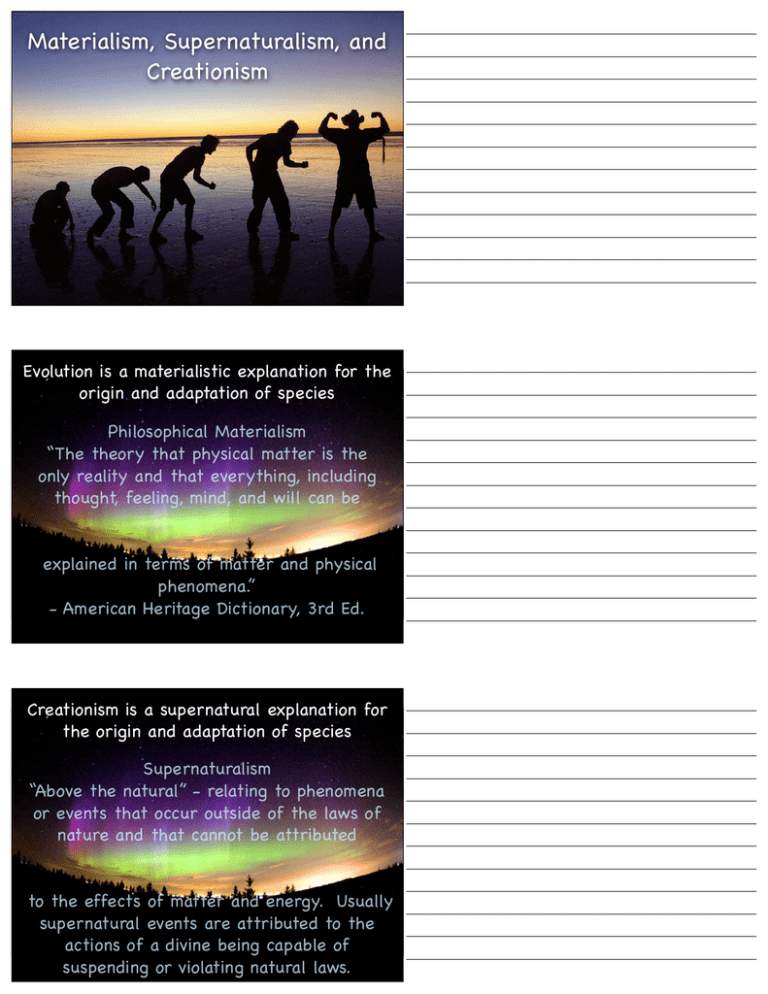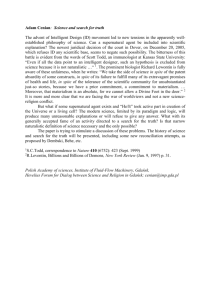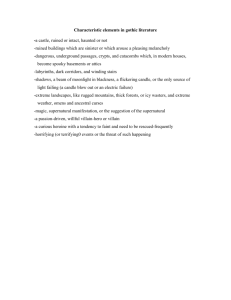Materialism, Supernaturalism, and Creationism
advertisement

Materialism, Supernaturalism, and Creationism Evolution is a materialistic explanation for the origin and adaptation of species Philosophical Materialism “The theory that physical matter is the only reality and that everything, including thought, feeling, mind, and will can be explained in terms of matter and physical phenomena.” - American Heritage Dictionary, 3rd Ed. Creationism is a supernatural explanation for the origin and adaptation of species Supernaturalism “Above the natural” - relating to phenomena or events that occur outside of the laws of nature and that cannot be attributed to the effects of matter and energy. Usually supernatural events are attributed to the actions of a divine being capable of suspending or violating natural laws. Methodological Materialism The principle implicit in modern scientific inquiry - only hypotheses that invoke matter, energy, and natural law are valid subjects for inquiry because these are testable and potentially falsifiable. Supernatural explanations are not valid subjects of scientific inquiry because the supernatural cannot be tested or studied by the methods employed to study the natural world. Belief in the supernatural is common to all cultures and may be an intrinsic part of human nature. Materialism came later to human thinking. Democritus 460-370 B.C.E • Atomism • Atoms and Void • Time is infinite. • No divine intervention. • No free will. • Happiness is an undisturbed soul. Democritus Laughing, Hendrick ter Brugghen, 1628 in Rijksmuseum, Amsterdam Epicurus 341-271 B.C.E • Materialistic metaphysics •atoms moving through void •no gods, no immortal soul •no divine intervention or purpose • Empiricist epistemology •knowledge from direct observation and logical deduction •no divine revelation Bust of Epicurus, Capitoline Museum Rome Titus Lucretius Carus c.99-c.55 B.C.E • Roman poet / Philosopher • Author of De Rerum Natura (The Nature of Things) a poetic exposition of Epicureanism • Materialistic explanations for all natural phenomena. • Postulated that the Earth gave birth to all plant and animal life, including humans. Bust of Lucretius By the end of the 1st Century, C.E., Lucretius, Epicureanism and Materialism are discredited by Christian philosophers and suppressed. Lucretius manuscripts are rediscovered during the Renaissance. St Jerome in his Study 1480 Fresco, Ognissanti, Florence De Rerum Natura is again widely read by the 17th Century. Methodological materialism (as opposed to philosophical materialism) becomes an increasingly accepted approach to studying and understanding the natural world beginning in the Late Renaissance. Copernicus Da Vinci Galileo Astronomer Steno Leeuwenhoek Isaac Newton Physicist Charles Lyell Geologist Beginning in the 17th Century, the epicurean principles of materialism and mechanism become the operational assumptions of a new human enterprise called science. Creationism The belief that species“Design are must have had a designer. That created by God through designer must have been a person. That supernatural intervention. person is GOD.” Natural Theology 1802 • Creation may be ongoing - new species appearing through time. • Adaptation is the evidence of design by an intelligent creator. • Creationism was the widely accepted explanation for the history and diversity of life on Earth until Darwin. William Paley (1743-1805) Paley’s most popular work was the book Natural Theology (1802). In it he argues that adaptation and function in species provide evidence that they were designed by their creator. In order to pass the B.A. examination, it was also necessary to get up Paley's 'Evidences of Christianity,' and his 'Moral Philosophy.' This was done in a thorough manner, and I am convinced that I could have written out the whole of the 'Evidences' with perfect correctness, but not of course in the clear language of Paley. The logic of this book and, as I may add, of his 'Natural Theology,' gave me as much delight as did Euclid. The idea that living things bear the hallmarks of an intelligent designer is an attractive one because so many aspects of organisms appear to be purposeful. Like Paley’s pocket watch, which was manufactured to keep track of time, organisms and their parts appear to have a predetermined function or “final cause”. Bee wings function based on an intricate mechanism to allow bees to fly. And bees fly so that they can pollinate flowers. How could these functions come about except through deliberate design? By the 1830’s biology remained the only major branch of science still rooted in a supernatural foundation. This would soon change due to the work begun by a young man named Charles Robert Darwin, who almost settled down to the life of a country parson. “Considering how fiercely I have been attacked by the orthodox it seems ludicrous that I once intended to be a clergyman.”



